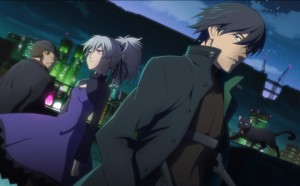
The main characters. The guy front and center is Hei, a contractor with the power to control electricity. Behind him is Lin, the mysterious girl with the power to track others through water. In the back are Mao, a talking cat, and to the left is Huang, their boss.
My friend Eric introduced me recently to Darker Than Black, a shonen anime revolving around superpowered killing machines beings called contractors who operate in and around Tokyo in a dystopian future. Like most enjoyable shonen I’ve seen, it skews heavily towards character development and action, often both at the same time.
Darker Than Black likes to throw you in the middle of the story, give you very little context, and let you fill in the gaps as the plot progresses. We’ve watched through the first twelve or so episodes, and the basic premise of the world and why it is the way it is has not been addressed in any revealing way. On the episode level too, characters, plot threads, symbols and scenes are introduced with as little context as possible. It’s very mysterious, often confusing, and honestly . . . really compelling. I can’t say I’ve watched or read to much in my life that went about telling a story in the same way, leaving the viewer in the dark as much as possible.
Denial of information can, in fact, be an effective tool for storytelling. It’s the classic reverse-psychological trick of saying you have a story to tell, but then insist that it’s not worth telling: people become naturally curious, and that curiosity can serve as the fuel that lights the engine of a compelling story.
MINOR SPOILERS. For example: The second episode revolves around a girl who slowly is becoming a contracter and her relationship with her father. It took me until deep into the second episode of this two-episode arc to understand just how complicated the episode was, and just as I came to that realization, the plot resolved itself in a fiery dynamo of emotion and action.
Lingering in the background of its distinct storytelling style are, of course, the conventions of shonen anime, too. The climax of every single arc (the series, at least on the DVD bundle Eric has, is cut up into a collection of short two-episode story arcs that are, for the most part, stand-alone) involves combat, and the aftermath of that combat always brings insight into the inner emotional workings of the combatants. In the aforementioned episode, the girl’s relationship with her father is fleshed out. As the episodes continue, we get bits and pieces of Hei’s relationship with his now-deceased sister. And of course, the basic premise of the story allows for each character to have unique super-powers that define them.
I’m pretty jealous of these conventions. They’re incredibly flexible and naturally invite conflict, resolution, and growth. And I can’t use them if I want to write a short story without seeming like a bizarre anime child.
Or maybe I can . . . ?
